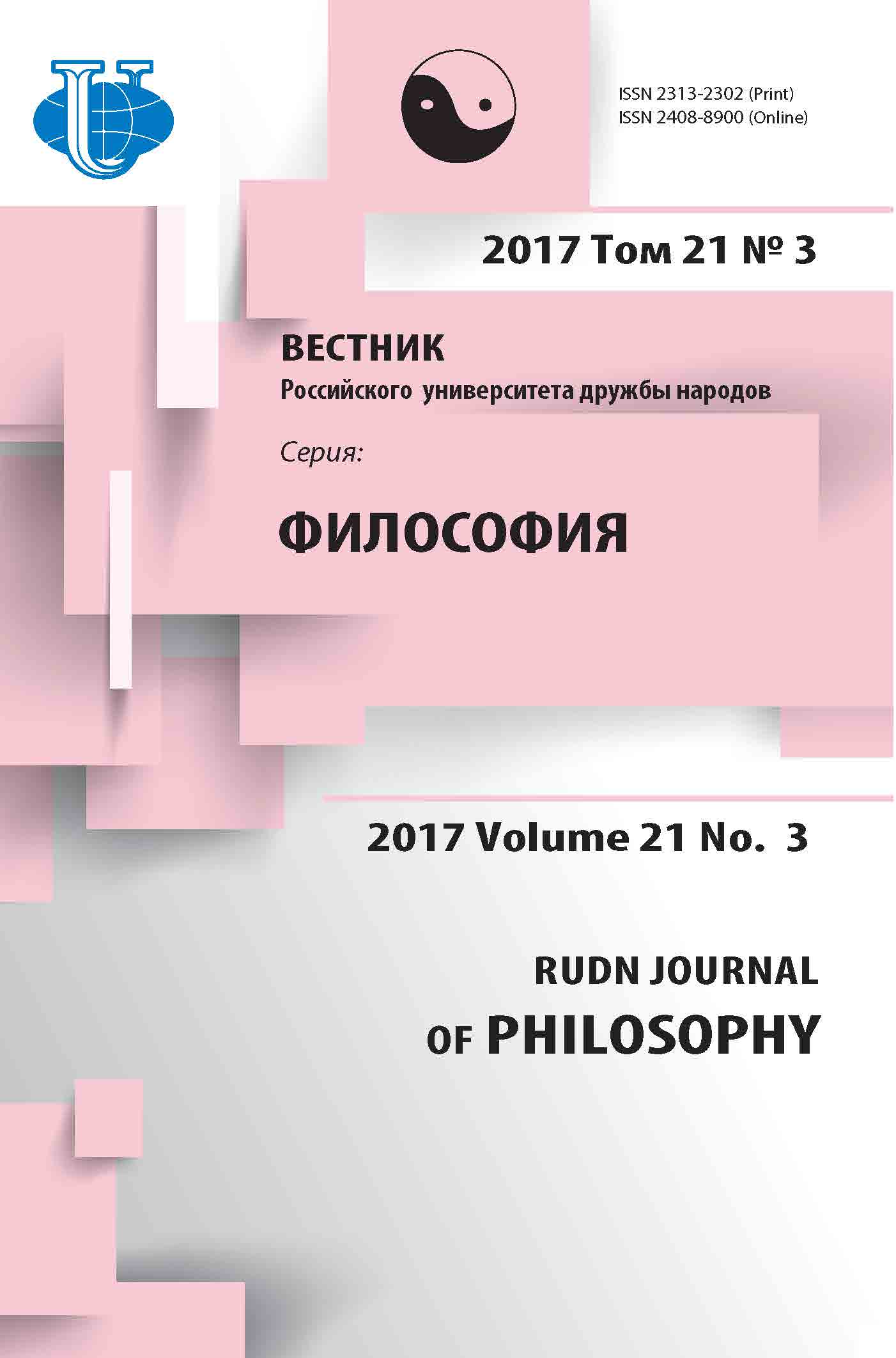EVOLUTION OF THE CONCEPT OF DIGNITY IN THE HISTORY OF ETHICS
- Authors: Sychev AA1
-
Affiliations:
- National Research Mordovia State University
- Issue: Vol 21, No 3 (2017)
- Pages: 305-313
- Section: Articles
- URL: https://journals.rudn.ru/philosophy/article/view/16977
- DOI: https://doi.org/10.22363/2313-2302-2017-21-3-305-313
- ID: 16977
Cite item
Full Text
Abstract
The article is devoted to the evolution of the concept of dignity in ethical and philosophical thought. On the basis of the etymology of the word, the author reveals the basic definition of dignity as a measure of the correspondence of a person’s behavior to his or her position in society and the approving reaction of the others to such behavior. This definition is corrected in the analysis of the views of Aristotle, the Stoics, Cicero, Thomas Aquinas, J. Manetti, J. Pico della Mirandola, T. Hobbes, J.-J. Rousseau, I. Kant, and others. It is shown that in the course of historical development (under the influence of philosophy and religion) the hierarchical understanding of dignity was gradually replaced by the universalist one. Analyzing the notions of dignity as a theoretical foundation of the human rights system and disputes about dignity in contemporary bioethics, the author concludes that dignity is an important personal and social value, which potential in solving complex ethical dilemmas of present time, despite the frequent use of this word in public discourse, is not yet fully realized.
Keywords
About the authors
A A Sychev
National Research Mordovia State University
Author for correspondence.
Email: sychevaa@mail.ru
Сычев Андрей Анатольевич - доктор философских наук, профессор кафедры философии Национального исследовательского Мордовского государственного университета им. Н.П. Огарева.
Bolshevistskaya ul., 68, 430005, Saransk, Russian FederationReferences
- Aristotel’. Bol’shaya etika. Soch. in 4 vol. Moscow: Mysl’, 1984. Vol. 4. p. 295—374. (In Russ).
- Aristotel’. Nikomakhova etika. Soch. in 4 vol. Moscow: Mysl’, 1984. Vol. 4. p. 53—294. (In Russ).
- Vseobshchaya deklaratsiya o bioetike i pravakh cheloveka. [Cited: 2017, Apr. 01]. Available from: http://www.un.org/ru/documents/decl_conv/declarations/bioethics_and_hr.shtml. (In Russ).
- Vseobshchaya deklaratsiya prav cheloveka. [Cited: 2017, Apr. 01]. Available from: http://www.un.org/ru/documents/decl_conv/declarations/declhr. (In Russ).
- Gobbs T. Leviafan. Soch. in 2 vol. Moscow: Mysl’, 1991. Vol. 2. p. 3—546. (In Russ).
- Grigorii Bogoslov. O lyubvi k bednym. Tvoreniya: in 2 vol. Saint Petersburg: Izd-e P. Soikina, 1912. Vol. 1. P. 204—230. (In Russ).
- Dal’ VI. Tolkovyi slovar’ zhivogo velikorusskogo yazyka: in 4 vol. Saint Petersburg: Izd-e Vol’fa, 1880. Vol. 1. 810 p. (In Russ).
- Innokentii III. O prezrenii k miru, ili o nichtozhestve chelovecheskogo sostoyaniya. Istoriya evropeiskoi kul’tury. Kiev: MAUP, 2004. p. 200. (In Russ).
- Kant I. Metafizika nravov. Soch. in 6 vol. Moscow: Mysl’, 1965. Vol. 4. Part 2. p. 107—438. (In Russ).
- Manetti Dzh. O dostoinstve i prevoskhodstve cheloveka. Obraz cheloveka v zerkale gumanizma: mysliteli i pedagogi epokhi Vozrozhdeniya o formirovanii lichnosti (XIV—XVII vv.) Moscow: Izd-vo URAO, 1999. p. 65—74. (In Russ).
- Piko della Mirandola Dzh. Rech’ o dostoinstve cheloveka. Estetika Renessansa. in 2 vol. Moscow: Iskusstvo, 1981. Vol. 1. p. 248—265. (In Russ).
- Russo ZhZh. Ob obshchestvennom dogovore. Traktaty. Moscow: Nauka, 1969. p. 151—302. (In Russ).
- Foma Akvinskii. Summa teologii. Kiev: Nika-tsentr, 2013. Vol. 2. Part 2. 830 p. (In Russ).
- Tsitseron. Ob obyazannostyakh. O starosti. O druzhbe. Ob obyazannostyakh. Moscow: Nauka, 1993. p. 58—158. (In Russ).
- Anttila R. Greek and Indo-European Etymology in Action. Proto Indo-European ag-. Amsterdam: JB Publishing Co, 2000.
- Macklin R. Dignity is a useless concept. British Medical Journal. 2003; 327:1419—1420.
- Pokorny J. Indogermanisches Etymologisches Wörterbuch. Bern: Francke Verlag, 1959. B. 1, 360 S. (In Germ.).
Supplementary files















